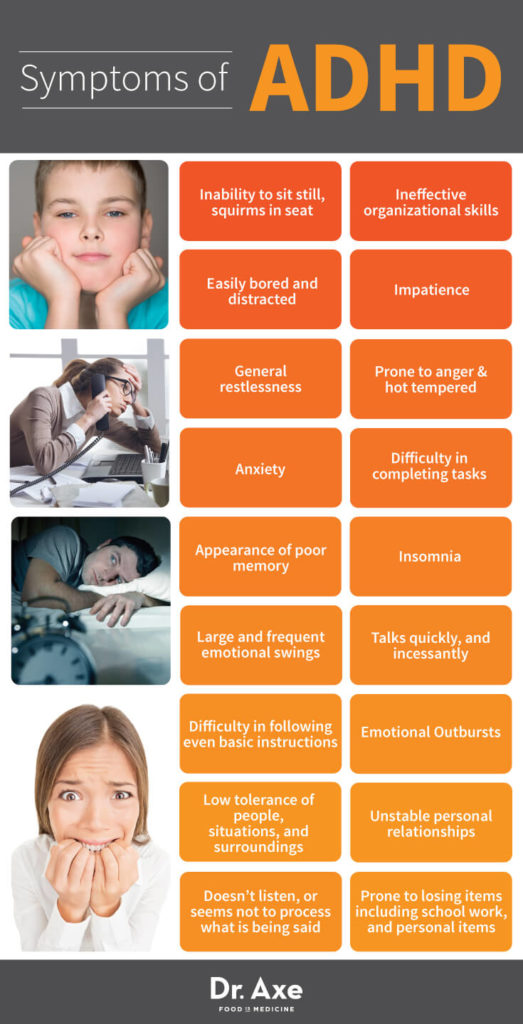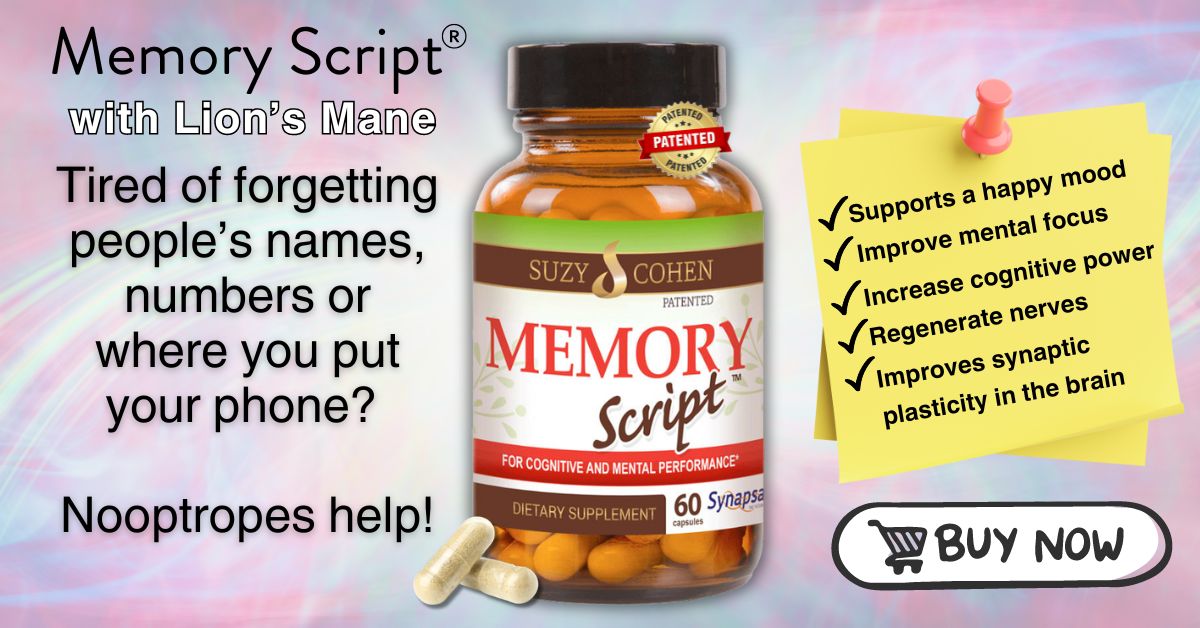What's On This Page?
ToggleCaffeine is the number one stimulant and psychoactive drug in the world! Would it surprise you to know that caffeine helps ADHD and that caffeine works similarly to medications that treat Attention Deficit Hyperactivity Disorder (ADHD)? It may be a cheap way to test the waters and try caffeine before shelling out thousands of dollars a year for expensive drugs.
Will it work as well? – I don’t know.
Will your doctor approve? – I don’t know, you’d have to ask.
Will it calm your child? – I don’t know but let’s talk about that today.
I’m writing to help you see if caffeine is a natural alternative to treating mild symptoms of attention problems. If it helps your teen feel better, then you know.
The point I’d like to make is this:
The category of ADHD medications such as Concerta, Adderall, Ritalin, Dexedrine, and others are “stimulant” drugs, and so is caffeine. They all raise certain compounds in the body such as dopamine and norepinephrine (and others).
Some say that caffeine is a cheap and natural way to treat ADHD! Personally, I love cheap and natural. So below you will find 6 reasons why I believe you have this option.
Why caffeine is a cheap and natural way to treat ADHD?
Adenosine Receptors
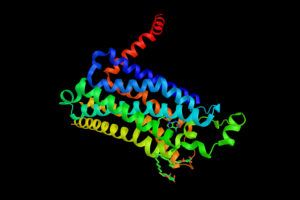
In order for you to understand how caffeine works, you should know about the P1 receptors, which is the abbreviated term given to your Adenosine Receptors. These are involved in millions of metabolic processes, and play a role in cognition, calmness and attention span.
These receptors are nothing fancy, they’re simply microscopic doorways on your cells, on trillions of cells in your body. When something binds to the receptor, it can cause the cell to do something or stop doing something (ie spark it to do something, or block it from doing something).
There are subtypes of these adenosine or “P1” (purinergic receptors) that you can look up later, some are subtypes called A1, some are A2a and there are several others. It is a big tangent to explain all that, just know that there are subtypes. In an effort to keep things simple right now, just imagine these “adenosine receptors” as having the ability to grab hold (bind) a compound called “adenosine,” or anything else that looks similar to adenosine, such as caffeine, or an asthma drug called theophylline and stimulant drugs for ADHD.
Drugs for ADHD bind to these adenosine receptors.
Caffeine Binds to Adenosine Receptors.
Caffeine keeps you awake by binding those adenosine receptors! It stimulates the cell to produce chemicals that make a regular person more active. That’s why it gives people like me insomnia and tachycardia if I drink coffee after 7 pm. Does that happen to you too? It’s because the caffeine binds to specific P1 receptors. In some people, the caffeine binds to the receptor and calms them down.
So BOTH caffeine and medication bind to P1 receptors and impact your brain and energy levels, and that action may differ from person to person. Your genes also impact how you respond to caffeine. I have a gene that causes me to enjoy the stimulating effects of coffee for 6 to 8 hours, whereas others might feel the stimulating benefits of caffeine for say, 2 or 3 hours. It lasts longer in me because I don’t break it down very fast. Same thing with alcohol, I’d be called “a cheap date” lol!
I do not have ADHD. If I took a stimulant drug like Ritalin, or a Triple Shot Vanilla Latte loaded with caffeine, the same physiological reaction would happen to me. I’d be so wired that I’d vacuum my house twice, and then vacuum all 4 of my neighbors! I’d probably jog 4 miles and come home and still be so wired I would write a new 350-page book for you! Kind of kidding, to make a point! But in a person with ADHD, the response is different.
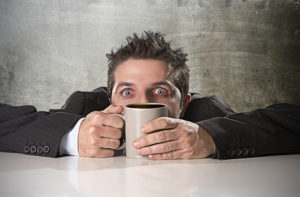
If they take one dose of a stimulant prescription drug like Ritalin (or a Triple Shot Vanilla Latte), they would feel calmer, more focused, and definitely not wired. I know, it’s confusing that one thing can have two completely opposing effects on the human body. But that explains why a person with ADHD feels good on stimulants, and other people feel panicky and wired.
In summary, stimulant medications act uniquely in a person with ADHD. And so does caffeine. It depends on the type of receptor they bind to and how much they antagonize the receptor. This goes back to those different subtypes I mentioned above.
In this regard, the drugs block that person’s ability to get wired, hyper, and stimulated. They calm things down as receptor antagonists. In a person with ADHD, caffeine appears to have the same effect, one that is calming. Before trying medication, you could try coffee, tea, or even dark chocolate (but it’s bitter) just to see if it calms things down, then you’d have a sense of what the pharmacy drug was going to do to you.
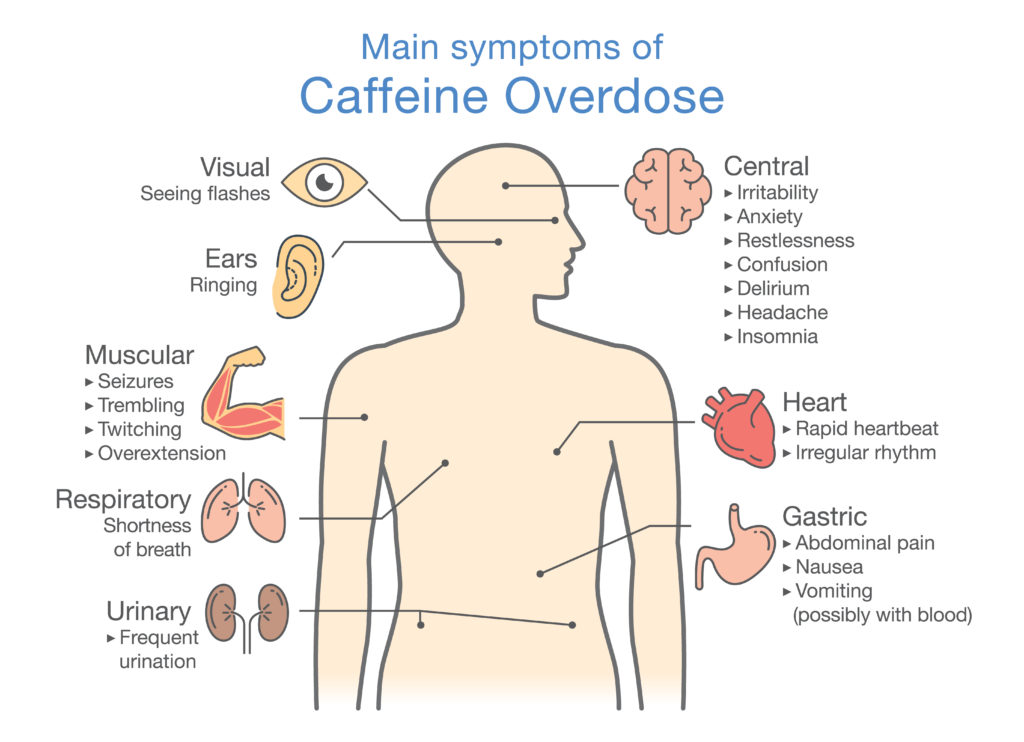
Top Reasons Why Caffeine Helps ADHD
1. Most all medical treatments for ADHD include a nervous system stimulant, which may sound strange to you, considering the patient appears to be overly active, wound up, or unfocused. But this is true, conventional treatment of ADHD utilizes physiological stimulants. And caffeine is one of them.
2. There was a STUDY about 6 or 7 years ago that was published in the journal called, European Neuropsychopharmacology, and it concluded that caffeine was useful since it helped to normalize levels of dopamine (which is exactly what the pharmacy drugs do). The drugs that are prescribed are stimulants and almost always increase levels of dopamine and norepinephrine.
Strattera (atomoxetine) acts to prevent norepinephrine breakdown (so it works for a longer time frame). This drug does not raise dopamine, so there’s a little bit lower potential for abuse.
Caffeine raises both dopamine and norepinephrine, and incidentally acetylcholine and serotonin. So it’s raising the same compounds as the medications, which is my point.
3. This STUDY was conducted on people with mild symptoms of ADHD, and the researchers evaluated tea that has some caffeine in it, (think black or green tea which has caffeine, not chamomile or any herbal tea.) They concluded that “The caffeine in tea can reduce one’s fatigue, increase people’s self-confidence, motivation, alertness, vigilance, efficiency, concentration, and cognitive performance.”
4. So profound is caffeine’s impact on the brain and cognitive function that Stanford University even funded a 24-person study to evaluate if dextroamphetamine (sold generically by the name, or brand Dexedrine) is superior to caffeine in treatment-resistant Obsessive Compulsive Disorder (OCD).
If you’d like to read about the thyroid’s role in OCD, and how hypothyroidism gets frequently misdiagnosed as OCD, Depression, or Anxiety, CLICK HERE.
5. Caffeine has been shown to extinguish the action of adenosine receptors (P1) in your brain. This was discussed in a 2014 review article published in the Journal of Psychopharmacology which recommended the use of caffeine for ADHD.
6. Just like methylphenidate, caffeine begins to work in about an hour, and as you might expect, the effect wears off after about four hours. They are absorbed and physiologically processed very similarly. Their MOA is extremely similar (mechanism of action). Even the side effects are similar. One is a prescription amphetamine drug, the other is America’s favorite hot coffee! Referring to lattes and Fraps, etc. Also, soda contains caffeine sometimes, depending on the brand. This is not my recommendation, however, you should know that a 12-ounce soda can contains approximately 40 mg of caffeine.
What’s the downside to caffeine?
There’s a downside to caffeine. Caffeine can wear out your adrenals if you take it long-term. Caffeine content varies with each food and beverage making daily dosing through diet somewhat difficult. With tea, the amount of time that you steep the teabag determines the caffeine content.
Another downside is genetics which impacts the type of symptoms that you have in ADHD. It’s not just one disorder with the same set of symptoms. It’s more individual due to the type of mutation (polymorphism or SNP) that is in the genetic strand. Environmental and behavioral factors play a role.
Because ADHD has different etiologies, and different genes involved, the medications and treatments work differently. If caffeine helps your 15 yo son, but not your neighbor’s 15 yo son, that wouldn’t surprise me.
Some people find that caffeine helps their ADHD, while others find that it doesn’t offer any benefit at all, or even makes their focus worse. Pay attention to your body and work with your doctor to find out what is best for you.
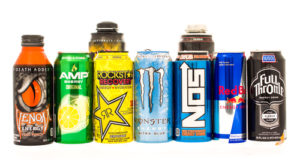
The American Academy of Pediatrics does not endorse giving energy drinks to adolescents, however, they are referring mainly to sports drinks that are jacked up with all kinds of stimulants, and also, they are referring to kids who do not have impulsivity, hyperactivity, or other symptoms In other words, this recommendation is not referring to persons with ADHD. You can read about that HERE. I do agree with them on this point.
Caffeine might be too weak to actually treat moderate or severe instances of ADHD. It may also exacerbate certain symptoms, and finally, if combined with medication, there would likely be detrimental effects to the heart, blood pressure, mood or brain function from the overstimulation. Remember caffeine increases feel-good endorphins, especially dopamine and norepinephrine. There is a very narrow therapeutic index for when dopamine and norepinephrine cause you to feel awesome, and when they make you feel horrid. Crossing that line is very easy to do with either pharmacotherapy or caffeine. This is common sense.
Excessive Caffeine is Bad For You
But remember, too much dopamine (from caffeine or stimulants) makes a regular person feel bad, as in anxiety, agitation, restlessness, fast pulse, panicky, and so on. But in a person with ADHD, the dopamine levels are already suppressed, so pushing that compound up with caffeine or stimulants makes them feel a little better, up to a point. So maybe a few cups of coffee during the day or an equivalent SMALL amount of caffeine in a pill (think Vivarin or NO-DOZ) might make a positive difference. You can break those pills into tiny pieces just FYI. Whether or not you should do that is entirely up to you and your physician. I’m not recommending it, I’m just telling you about options so you can have a competent conversation with your doctor.
Its common sense caffeine boosts focus and concentration for many people who jokingly refer to it as “brains in a cup.” Since caffeine is a stimulant drug, it mimics the effects of amphetamine “stimulant” medications like dextroamphetamine, methylphenidate, and others, but of course, caffeine is milder in terms of effect, and side effects.
Too much caffeine or too high of stimulant medication may cause:
- Insomnia
- Tachycardia
- Aggression and Irritability
- Anxiety
- Restlessness
- Muscle twitching or tremors
- Diarrhea
- Stomach cramps
- Dehydration
- Leg cramps
Caution with Stimulants
The intake of caffeinated drinks, caffeine pills, or energy drinks containing caffeine or guarana may seem like a nice and exciting alternative to prescription medications, I just want to caution you that if combined with conventional (amphetamine) medications, the impact could be dangerous. Again, amphetamine is the scientific word for something that acts just like “speed” in case you’ve heard of that street drug. Pharmaceuticals are not quite that strong, but they are amphetamines just the same.
A person taking both amphetamine-derived meds and caffeine might experience harmful reactions that require hospitalization, so be very careful as you approach this substance, and have clear conversations with the doctor/therapist.
Caffeine may be dispensed by baristas worldwide, but it is a psychoactive stimulant drug by definition. For sure it can increase alertness and brain power. If it were me, or my daughter or son with ADHD, I would consider tea, coffee or lattes as a method of treatment before stimulant medications which are stronger and more expensive. They carry side effects too. I would also consider DHA Fish Oil for it’s ability to support brain function and cognition.
Many studies point to DHA as a supportive essential fatty acid and this can be taken with medications or caffeine.
ADHD is difficult to treat but doable.
Performance in school is important, as well as self-esteem. Doctors are too quick to medicate a child, and families feel like they have no other choice. There are many interventions and methods to address ADHD. Don’t assume that only amphetamines will work. Be open-minded and pose the question if it’s okay for your child to have a cup of coffee or a cup of black tea (for example) even if they are 12 years old.
If approved, then monitor your child closely, just as you would if he/she were on a drug. In small doses, a little caffeine will increase alertness, mood, and focus. However, excessive amounts will cause aggression, restlessness, insomnia, nervousness, headaches, diarrhea and a racy heart.
This isn’t something we talk much about in America. I realize I’m out on a limb here because drugs are painted out to be the sole and only responsible method to quell the ADHD issue if it even is an issue! The medical group’s dogma is founded on the belief that all people with ADHD should be treated with stimulant medications. I’m just saying caffeine is one of them!
And I’m not alone in that thinking. According to recent stats, over 15 percent of teenagers living in Australia are regularly drinking coffee! On average, the consumption of caffeinated tea among fourteen to seventeen yo kids is about a cup per day.
How much caffeine is too much?
The FDA has not fully defined the recommended limits for caffeine in adolescents, however, Canada has made some pretty good rules to follow:
Age Do Not Exceed
4 to 6 45 mg
7 to 9 62 mg
10 to 12 85 mg
If you’d like to see the caffeine content in your favorite beverages and foods, like Starbucks, Pepsi, Jelly Belly’s, Häagen-Dazs, or Breyer’s ice cream, and more brands, CLICK HERE to be taken to a website that lists the amount in mg.

Suzy Cohen, has been a licensed pharmacist for over 30 years and believes the best approach to chronic illness is a combination of natural medicine and conventional. She founded her own dietary supplement company specializing in custom-formulas, some of which have patents. With a special focus on functional medicine, thyroid health and drug nutrient depletion, Suzy is the author of several related books including Thyroid Healthy, Drug Muggers, Diabetes Without Drugs, and a nationally syndicated column.
